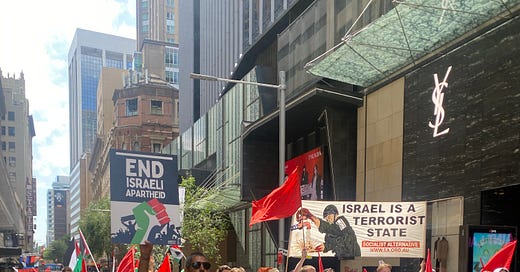Australia’s Glimmer Of Hope: A Path To Accountability For Palestine
Recent political moves signal that global accountability for Israel’s apartheid and genocide is possible—if we demand it.
As I write this, I reflect on standing on stolen land of the Gadigal people of the Eora Nation, and I acknowledge their resilience in the face of ongoing colonialism.
Watch video of my speech in Sydney above.
There is a shared history between Indigenous Australians and Palestinians, one of dispossession and survival, reminding us that the fight for justice is universal.
I spoke with a heavy heart today. Over 2 million Palestinians, half of them children, are trapped in what can only be described as an open-air prison.
For 432 days, Israel’s genocidal campaign has claimed thousands of lives, with nearly half of the victims being children.
The brutality is staggering: hospitals bombed, families obliterated, and the specter of starvation weaponized against an already devastated people.
This is not a war. It is genocide.
A systematic, deliberate attempt to erase a people, their history, and their identity. And yet, governments and media globally collude to mask this reality with euphemisms like “self-defense.”
For decades, Israel’s aggression has extended beyond Palestine. And today it is accelerating. From massacres in Lebanon to the illegal occupation of Syria’s Golan Heights, the pattern is clear: colonial expansion and ethnic cleansing cloaked in the language of democracy and security.
Meanwhile, Western governments funnel billions of dollars to Israel, funding bombs, bulldozers, and settlements, all while dehumanizing Palestinians through media complicity.
Yet, amidst this darkness, there are glimmers of hope—and just might be one of them.
In recent weeks, Australia has shifted its diplomatic stance.
It supported a UN resolution demanding Israel end its occupation and settlement expansion in Palestinian territories.
Australia also joined over 150 nations calling for a permanent ceasefire in Gaza.
These actions, however small, matter. They signal cracks in the wall of unconditional support for Israel’s apartheid regime.
This shift did not happen in isolation. It is the result of tireless advocacy by ordinary Australians who occupied city halls, protested in the streets, and demanded their government take a stand. It’s because of Indigenous solidarity with Palestinians, born of shared experiences of colonization and genocide. It’s because people refused to remain silent.
Reports also emerged last week of two Israeli soldiers being denied visas to Australia—small, symbolic acts that point toward the potential for real accountability. These steps must be the beginning of a broader movement to hold Israel accountable for its crimes.
History shows us that change comes when people rise up and demand it. Apartheid fell in South Africa because the world stood together. Colonial powers have been forced to retreat because people refused to accept the unacceptable.
So what can we do?
1. Demand accountability from our governments. Cut ties with apartheid regimes. End arms deals that profit from Palestinian blood.
2. Boycott companies complicit in the occupation.
3. Challenge the lies of the media and speak truth to power.
Justice is not a luxury; it’s a right.
Change is possible. Let us build on this momentum. Until Palestine is free, none of us are truly free.
From the river to the sea, justice and liberation for all human beings must prevail — that is not complicated.
Australia has recently made several notable moves reflecting a shift in its policy regarding Israel and Gaza:
1. Support for a UN Ceasefire Resolution: On December 12, 2023, Australia voted in favor of a UN General Assembly resolution calling for an immediate and unconditional ceasefire in Gaza. This marked a shift from its earlier abstention on a similar motion in October, signaling a stronger stance on prioritizing humanitarian concerns and the protection of civilians .
2. Backing a Two-State Solution: Australia reaffirmed its commitment to a two-state solution alongside leaders from New Zealand and Canada. The joint statement emphasized opposition to the reoccupation of Gaza, forced displacement of Palestinians, and called for international law to protect civilians. It also outlined that Hamas should not have a role in Gaza’s future governance .
3. UN Vote on Israeli Withdrawal: In another significant policy move, Australia supported a UN resolution urging Israel to withdraw from Palestinian territories occupied since 1967, including East Jerusalem. This aligns Australia more closely with broader international calls for respecting Palestinian sovereignty and ending occupation .
These changes suggest an evolving approach by the Australian government, reflecting growing pressure to align its foreign policy with international humanitarian norms and community concerns.







Perfectly said!